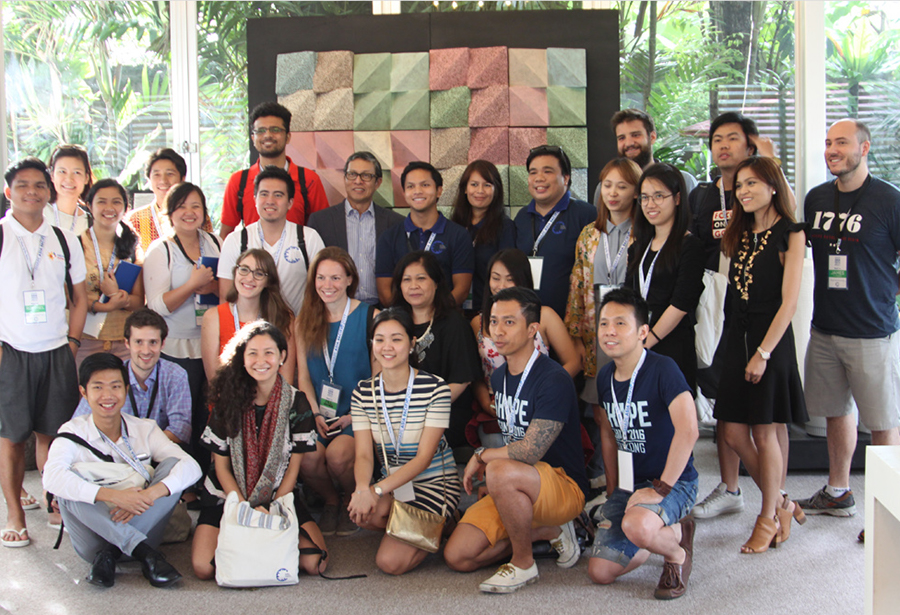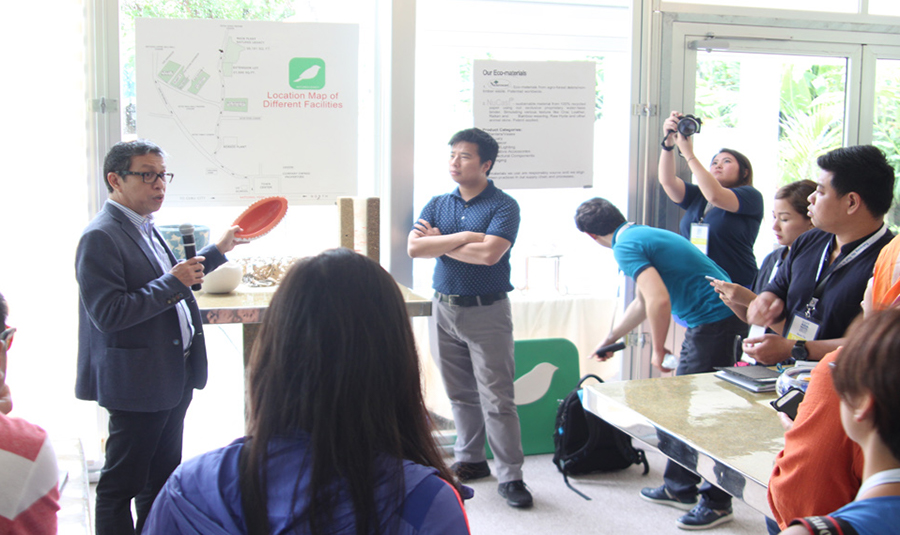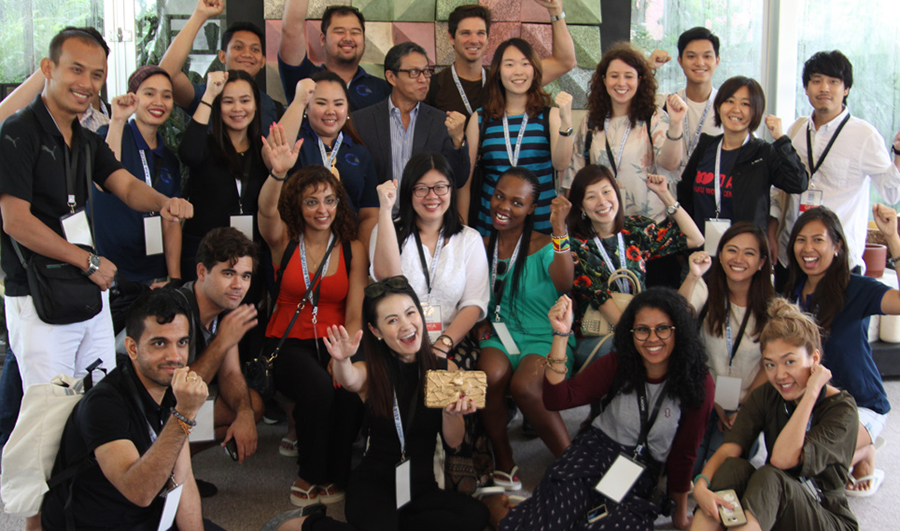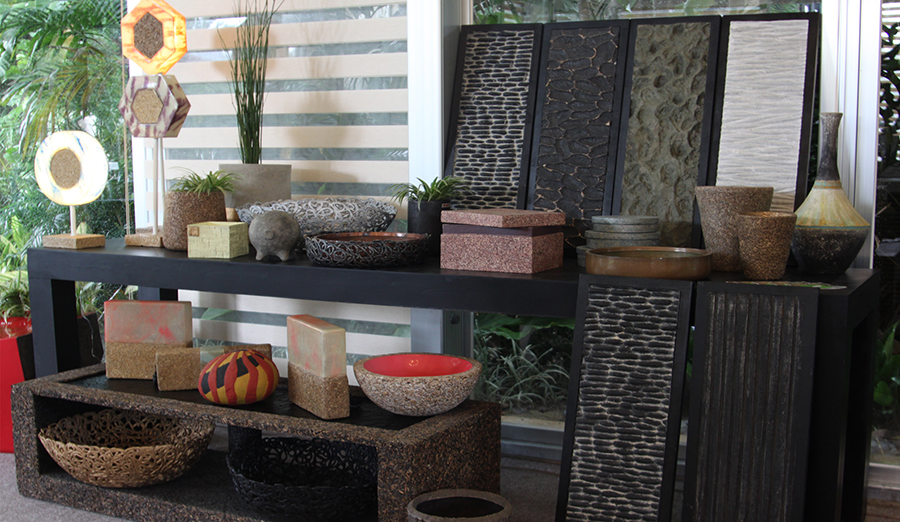NATURES LEGACY
WORLD ECONOMIC FORUM
OCTOBER 13, 2017
GLASS HOUSE
MONTEBELLO VILLA HOTEL, CEBU CITY, PHILIPPINES
LAS VEGAS—NaturesCast, Inc. of Las Vegas, a member of the Sustainable Furniture Council, has entered the U.S. hospitality market with a line of chic and modern furniture, and décor accessories made from agro-forest waste. A Filipino-based eco-friendly master furniture and décor accessories manufacturer, NaturesCast functional and artistic décor products are unique in that they are constructed from agro-forest waste including dry leaves, dead twigs and barks from the forests around Compostela, Province of Cebu, Philippines.
The collected materials are shredded through a special machine and bonded together using an odorless water-based binder and then shaped into a variety of unique and functional forms. Many of these unique furniture and décor items are already being used in hotels around the world, especially those that are eco-friendly and green products oriented.
The furniture and décor accessories being introduced to the U.S. hospitality market are currently available through the Las Vegas Showroom and on the website at www.naturescast.com. NaturesCast will open a permanent showroom at the Las Vegas World Market on July 28, 2008.
NaturesCast has more than 60 different products available to the hospitality market. Products, available individually or by container load, include vases, tables, table accents, trays, bowls, frames, couches, chairs, stools and more. All products are contemporary yet classy and come in a variety of colors including natural, black, RC tone, brown and two-tone.
Go to NaturesCast.
Source: http://www.greenlodgingnews.com/content.aspx?id=2388
ECO-FRIENDLY FURNISHINGS ARE CREATED FROM FOREST DEBRIS
-- Home Accents Today, 7/15/2008 8:46:00 AM
NaturesCast, a Las Vegas-based manufacturer of modern environmentally friendly furniture and home decor accessories, is opening its first permanent showroom in Building C, spaces 05740 and 785, of the World Market Center.
The company’s contemporary collection of vases, tables, lamps, accents, trays, bowls, frames, couches, chairs and stools are created using agro-forest waste -- dry leaves, dead twigs and barks from the forests around Cebu, Philippines. The collected materials are shredded and bonded together with an odorless water-based binder, then shaped into a variety of unique and functional forms.
“The showroom in the World Market Center gives us a larger and permanent presence in the market,” said NaturesCast CEO Pete Delantar. “We have been attending tradeshows and other similar events but a permanent showroom will give buyers an opportunity to see our product line in its entirety.”
Source: http://www.homeaccentstoday.com/article/CA6578780.html
Just in time for our Green @ Home month is this question from concerned reader Timothy:
"Dear AT, I'm looking to furnish my new now empty studio apartment with a couple pieces of furniture thanks to my economic stimulus package (finally got it!). The one thing I wanted to make sure was whatever I purchased, it would be eco-friendly and manufactured according to some sort of standards that would give me some sort of assurance of its "green-ness". Is there some sort of list of green compliant manufacturers/stores I can refer to when shopping online or offline?"
Hi Timothy. Thanks for the great question. The Sustainable Furniture Council is a helpful resource to refer to when choosing eco-friendly furnishings. The requirements for the SFC designation include detailing the complete supply chain of how things are made and where supplies come from, a reduction of wastes and pollutants during the manufacturing process, and the reduction of emissions during their transport (like the offerings from NaturesCast shown at the top of this post). Here's a complete list of manufacturers and retailers participating in the SFC with more details about the identification program.
Also consider purchasing used furniture, a very eco-friendly decision and one that might save you a lot of money. Here's a great list of used furniture shops with unique offerings that run the gamut of traditional, ethnic and modern.
Los Angeles
gregory
July 1, 2008 05:00PM
Furniture Makers Use Recycled Rubber,
Twigs, Yarn, Even Flip-Flops on the Outside
By SARA LIN
May 30, 2008; Page W8
In every industry there's a push to be ecologically aware. Many deploy under-the-cover green techniques, such as using recycled raw materials. But some home furnishings designers are displaying their eco-awareness on the surface.
Catalogs and specialized retailers are selling goods ranging from a chair covered with recycled yarn to planters made from old tires. Many of these products have a modernist flair, compared to the frumpy green-oriented products of a decade ago such as beanbag chairs made of hemp.
Bonnie Dahan tried to start a mail-order catalog of stylish but ecologically correct home products in 2000, but "it was almost impossible to find anything eco and beautiful," she says. Today, Ms. Dahan says, she easily fills the pages of the catalog she co-founded, VivaTerra.
Most mainstream home-products makers, meantime, are promoting more subtle ecological attributes. Pottery Barn, for instance, says that some of its sofas are filled with 20% to 30% soy-based materials, and certain cushions are stuffed with a mixture that includes recycled plastic bottles.
But niche makers are coming out with products that let consumers display their green credentials in more obvious ways. When designer Thaddée de Slizewicz turned recycled tires into rubber tubs for the home he didn't make any effort to disguise their origins: "Of course you are thinking about the tire when you're looking at it," says the French designer. "That's why people love it." One version of his rubber planters and tubs has sold out at the Design Within Reach chain since it was introduced in April.
It took Stephanie Forsythe a year to figure out the right mix of new and recycled materials for her cylindrical Molo stools. She tried making the collapsible pieces exclusively with recycled cardboard but after vigorous testing the chairs began disintegrating. ("We threw a big party and let Charlie the dog run all over them -- he's 80 pounds," she explains.) Ms. Forsythe settled on a 50/50 mix of recycled cardboard and new Kraft paper -- the latter contains long fibers that act as a reinforcement.
VivaTerra's Ms. Dahan offered globe-shaped pendant lamps made of intertwined vines but canceled them after they didn't do well. "They weren't unusual enough," she says. Ms. Dahan adds that she turns away dozens of eco products she is pitched by designers, including serving bowls made of melted plastic records. "Things like that look very funky but not sophisticated."
Some design-industry experts are skeptical that showy, limited-production green products can do much to help the environment. The invisible side of goods -- the manufacturing -- needs to be green, too, and these products must go mass-market to have much impact on the environment, says Deb Johnson, academic director of sustainability at New York's Pratt Institute design school. Products such as ottomans and bathmats made from recycled flip-flops are "whimsical and interesting, but it's not doing things at the deepest level. I don't think they're going to sell millions of these things," Ms. Johnson says.
But like hybrid-car drivers who let their vehicles demonstrate their environmental awareness, buyers of these blatantly green products seem to like having them become conversation pieces. When Jack Shamama bought a Miss Rio ottoman, made from shredded overstock flip-flops, he wasn't prepared for the questions he would field from guests about the furniture, which resembles a giant Koosh ball. "The response is almost always, 'Were they [the flip-flops] used?'" he says. Answer: They weren't.
Molo chair
Stephanie Forsythe and Todd MacAllen were living and working in a one-room studio in Vancouver, Canada, when they came up with the collapsible Molo chair. It's available in several sizes and materials, including white polyethylene, and starts at $170. The brown version (shown), made of 50% recycled cardboard, develops a crushed-down patina as it ages -- which may not be to everyone's taste. "We genuinely feel it gains character and beauty with use over time," Ms. Forsythe says.
Naturescast bench
Cleaning crews were trimming overgrown fields outside the Philippines furniture factory of Pete and Catherine Delantar in 2002 when the couple decided the dead grass, twigs and tree bark ought to be reused. They spent two years perfecting a water-based glue to bind the shredded jungle waste into a mixture they dubbed Naturescast. The catch: It isn't strong enough to hold a shape -- it must be reinforced. The $570 Barque Bench has a formaldehyde-free plywood frame made of compressed sugar-cane fibers.
Recycled-tire tubs
Thaddée de Slizewicz first began experimenting with recycled tires 10 years ago. The Paris-based designer, who specializes in bath accessories, says his products are inspired by his travels: In Vietnam he watched a barber mix shaving foam on a rubber tire scrap, leading him to look into rubber shaving accessories. "The rubber tire is a modern object that's universally available -- including in a rubbish dump," he says. A set of three of his rubber tubs (one is shown) is available from Design Within Reach for $350.
Giramundo Chair
Thomas Bina, founder of Environment Furniture, discovered the chair at a shop in Salvador, Brazil. He made a few tweaks to Brazilian designer Marcus Ferreira's model and introduced it to the U.S. last year for $2,150. The multicolored cover is hand-sewn in a Brazilian village from yarn remnants tossed out by textile factories. "I knew it was a little out there," says Mr. Bina, but "I knew it would sell well in New York."
Timber Block stool
Made from monkey pod tree branches that typically are left for waste during lumber-cutting in Thailand, these hand-hewn stools can double as tables. Held together by a chemical-free glue, each weighs about 48 pounds and costs $369. But watch out for spills -- the top surface isn't lacquered since "that wouldn't be eco," says Bonnie Dahan, who commissioned the stools for her VivaTerra catalog.
Write to Sara Lin at sara.lin@wsj.com
Source: http://online.wsj.com/article/SB121210765306731281.html
Contact us for updates on our latest innovations, exhibits, and more
Subscribe for updates on our latest innovations, exhibits, and more
Subscribe for updates on our latest innovations, exhibits, and more
CONTACT US
info@natureslegacy.com
Facebook
Instagram
CONTACT US
info@natureslegacy.com
Facebook
Instagram
CONTACT US
info@natureslegacy.com
Facebook
Instagram
CONTACT US
info@natureslegacy.com
Facebook
Instagram
CEBU SHOWROOM
Area 77 CVD Comp. P. Remedio St. Banilad Mandaue City, Cebu, Philippines 6014 Tel No. +6332 425 8399 / +6332 3459619 By appointment only
CEBU HEADQUARTERS
+6332 520 9523
Area 77 P. Remedio St., Mandaue, Philippines
CEBU HEADQUARTERS
+6332 520 9523
Area 77 P. Remedio St., Mandaue, Philippines
CEBU HEADQUARTERS
+6332 520 9523
Area 77 P. Remedio St., Mandaue, Philippines
FACTORY
Upper Cogon, Compostela, Cebu Philippines 6003
FACTORY
+6332 425 8814
+6332 425 8399
Upper Cogon, Compostela
FACTORY
+6332 425 8814
+6332 425 8399
Upper Cogon, Compostela, Philippines
FACTORY
+6332 425 8814
+6332 425 8399
Upper Cogon, Compostela, Philippines






